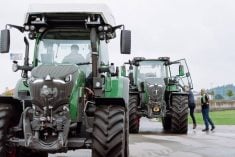Canada’s chief veterinary officer has added another job title to his resumé and a new responsibility for food safety in Canada.Dr. Brian Evans began his new job as Canada’s chief food safety officer June 28 after a late-May appointment by prime minister Stephen Harper.He continues to be chief Canadian veterinary officer but gives up his role as executive vice-president of the Canadian Food Inspection Agency.Evans was replaced by George Da Pont, a former commissioner of the Canadian Coast Guard, who has a master’s degree in history from the University of Saskatchewan.On his first day on the job, Evans said the new assignment – a deputy minister level position – will relieve him of most of his administrative responsibilities.“It allows me to put more focus on science and food safety,” he said. “It allows me to focus more on contacts across government, across the country and internationally.”The chief food safety officer position is a first for Canada, although similar positions exist in Europe, Australia and New Zealand.Evans said it is a political recognition of the growing consumer concern about food safety.“I think we have a robust science-based system, but you can always build on it.”Evans recently reflected on the responsibilities he expects will come with the new job.* When CFIA was created in 1997, it was supposed to work horizontally with other governments and government departments, but the trend has been to concentrate on its own job and staff.He said he will work more closely with other departments, including Health Canada, the Public Health Agency of Canada, provincial medical health officers and international food safety officials.* He will spend more time visiting front-line CFIA staff and supporting their decisions, which often are controversial in the industry.* The cost-of-business impacts of Canadian food safety regulations are an issue for the industry, and Evans said dealing with them will be part of his mandate.“We are a regulator, but we will also take a close look at driving unnecessary costs out of the system.”* Increasing numbers of consumers and food industry players are concerned about competition from food imports that may have been produced without adhering to Canadian standards.Evans said that will be an issue for him.“The global food system is paying increasing attention to the issue of standards and we will be watching that closely and following the audits,” he said.“The spotlight is very much on can we be sure that what is coming into the country meets our standards. We have to be able to give absolute assurance that the risk associated with imports is properly handled.”He said a global food safety initiative has introduced the concept of third-party audits of national reports on food safety, which he called a key tool.“I don’t think the evidence supports the idea that we are importing substandard food.”He said a major part of the job will be working outside the CFIA and its traditional partners. During his first two hours on the job, two calls involved outside offices with a stake in the food safety system.“I would say that at least 30 percent of my time should be devoted to working with other partners in the system.”Evans was the face of the CFIA during the BSE crisis beginning in 2003. He spoke for the agency when new cases were discovered and often represented Canada on trips abroad to try to open foreign markets based on Canada’s responses and its controlled risk status.
Read Also

Why feds imposed EV tariffs
Moe and Kinew have a fight on their hands when it comes to eliminating the EV tariff. Canada has to worry about pissing off the U.S. and Mexico and hundreds of thousands of auto workers.














